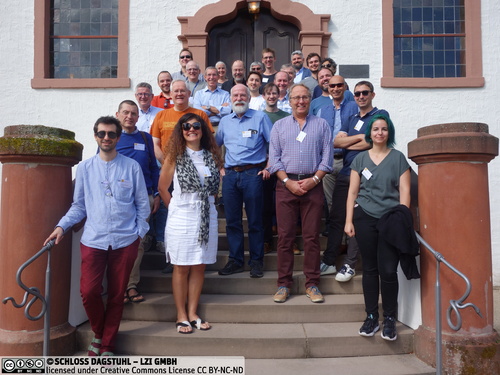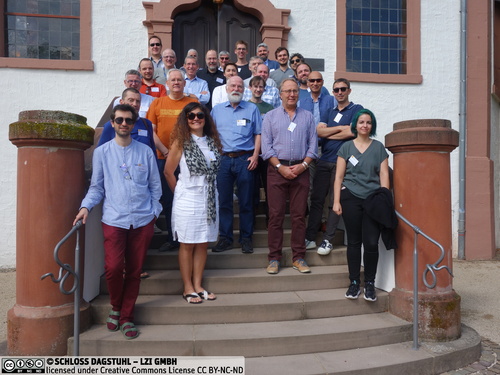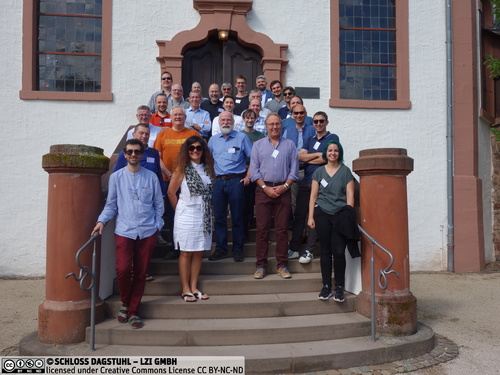Dagstuhl-Seminar 22362
Model-Driven Engineering of Digital Twins
( 04. Sep – 09. Sep, 2022 )
Permalink
Organisatoren
- Benoit Combemale (University & IRISA - Rennes, FR)
- Vinay Kulkarni (Tata Consultancy Services - Pune, IN)
- Bernhard Rumpe (RWTH Aachen, DE)
- Steffen Zschaler (King's College London, GB)
Kontakt
- Marsha Kleinbauer (für wissenschaftliche Fragen)
- Simone Schilke (für administrative Fragen)
Programm
Digital twins are an emerging concept with the potential for revolutionising the way we interact with the physical world. Early versions of digital twins have already been applied successfully in almost all known areas, including engineering and development areas, but also scientific domains and cultural, social, and economic domains.
Digital twins are leveraging the digitalization of increasingly more application domains and are intensively using various models of different types in a descriptive, predictive, and prescriptive way. Furthermore, the the ever-increasing availability of data, the last improvements of sensor technologies, and the reliable connnectivity enable direct inspection and manipulation of real-world systems, both for physical systems and objects as well as social systems and organisations respectively their processes.
The concept has seen strong interest in industry, where there is a desire to control increasingly complex systems of systems, ensuring they behave as expected and to control their adaptation to the environment or any deviations with the initial plan. Digital twins can be used for improved analysis and understanding of complex systems (in silico experimentation) as well as for control and transformation of these systems. Digital twins are themselves complex software systems, posing novel software-engineering challenges, which have so far not been sufficiently addressed by the software-engineering research community.
There is a need for solid foundations to ensure the development of tools and methods according to well-established principles. We believe that Model-Driven Engineering (MDE), will be a key technology for the successful systematic engineering of Digital Twins. In this Dagstuhl Seminar, the goal was to bring together both practitioners and researchers to
- (i) reflect on the concept of Digital Twins and the software-engineering challenges posed,
- (ii) identify relevant existing MDE approaches and technologies that can help tackle the challenge of systematically engineering digital twins, and
- (iii) define an academia–industry research roadmap for systematic engineering of digital twins based on MDE.
As the intended primary goal of the seminar is to create a community and establish a research roadmap, we have been discussing the following topics:
- Challenges faced in real-world development of Digital Twins.
- Opportunities offered by MDE.
- Active exploration of collaboration opportunities.
The following paper reflects the discussions and some of the outcomes, however, we also identified that the overall topic is not only relevant, but also highly innovative, which is why this paper does only reflect an intermediate status of discussions and results, but the community will vividly go on to solve the challenges identified and addressed in the rest of this paper.
One key outcome of the seminar and its continuing community activities will be to contribute to a solid research roadmap for the new Software Engineering sub-discipline of Model-Based Development of Digital Twins.
Definitions to set the stage
There are two core terms that need appropriate definitions, namely model driven engineering (MDE) and digital twin. While MDE (and with it the terms model and modeling language) are relatively straightforward, there are different variants of definitions for digital twins that served as a starting base.
Definition1 (Model Driven Engineering (MDE)) Model Driven Engineering is a state-of-art software engineering approach for supporting the increasingly complex construction and maintenance of large-scale systems [4, 3, 2]. In particular, MDE allows domain experts, architects, developers to build languages and their tools that play an important role in all phases of the development process [7].
As digital twins are currently a relatively young and in particular evolving area of research, it is not surprising, that there is a variety of different definitions available. (E.g. [1] identifies more than hundred different definitions).
At the beginning and during the seminar we identified the following definitions to be particularly of interest.
Definition 2 (Digital Twin (DT)) A digital twin (DT) is a comprehensive digital representation of an actual system, service or product (the Physical Twin, PT), synchronized at a specified frequency and fidelity [5]. The digital twin includes the properties, conditions and behavior of the physical entity through models and data, and is continuously updated with real-time system data. The exchange of data between the digital and the physical twins takes place through bidirectional data connections.
An alternative definition can be found at the website of the software engineering institute of RWTH Aachen University together with some additional discussions:
Definition 3 (Digital Twin (DT)). A digital twin of a system consists of
- a set of models of the system and
- a set of digital shadows, both of which are purposefully updated on a regular basis,
- provides a set of services to use both purposefully with respect to the original system, and
- can send
- information about the environment and
- control commands to the original system.
Definition 4 (Digital Twin System (DTS)) Based on these definitions, a Digital Twin System can be defined as the combination of an actual system and the DTs of this actual system.
References
- Manuela Dalibor, Nico Jansen, Bernhard Rumpe, David Schmalzing, Louis Wachtmeister, Manuel Wimmer, and Andreas Wortmann. A cross-domain systematic mapping study on software engineering for Digital Twins. Journal of Systems and Software, November 2022.
- John Hutchinson, Mark Rouncefield, and Jon Whittle. Model-driven engineering practices in industry. In Proceedings of the 33rd International Conference on Software Engineering, pages 633–642. ACM, 2011.
- John Hutchinson, Jon Whittle, Mark Rouncefield, and Steinar Kristoffersen. Empirical assessment of mde in industry. In Proceedings of the 33rd International Conference on Software Engineering, pages 471–480. ACM, 2011.
- Stuart Kent. Model driven engineering. In Michael Butler, Luigia Petre, and Kaisa Sere, editors, Integrated Formal Methods, pages 286–298, Berlin, Heidelberg, 2002. Springer Berlin Heidelberg.
- MDT. Digital twin consortium, “glossary of digital twins,”. https://www. digitaltwinconsortium.org/glossary/index.html, 2021.
- Paula Munoz, Javier Troya, and Antonio Vallecillo. Using uml and ocl models to realize high-level digital twins. In 2021 ACM/IEEE International Conference on Model Driven Engineering Languages and Systems Companion (MODELS-C), pages 212–220. IEEE, 2021.
- Juha-Pekka Tolvanen and Steven Kelly. Metaedit+: defining and using integrated domainspecific modeling languages. In The 24th ACM SIGPLAN conference companion on OOPSLA, pages 819–820, 2009.
 Loek Cleophas, Thomas Godfrey, Djamel Eddine Khelladi, Daniel Lehner, Benoit Combemale, Bernhard Rumpe, and Steffen Zschaler
Loek Cleophas, Thomas Godfrey, Djamel Eddine Khelladi, Daniel Lehner, Benoit Combemale, Bernhard Rumpe, and Steffen Zschaler
Digital twins are an emerging concept with the potential for revolutionising the way we interact with the physical world. They have already been applied successfully in areas such as Industry 4.0 or traffic management. Digital twins are leveraging the digitalization of increasingly more application domains and are intensively using various models of different types (descriptive, predictive, and prescriptive) together with the ever-increasing available data to enable in silico inspection and manipulation of real-world systems (including physical systems and objects as well as social systems and organisations).
The concept has seen strong interest in industry, where there is a desire to control increasingly complex systems of systems, ensuring they behave as expected and to control their adaptation to the environment or any deviations with the initial plan. Digital twins can be used for improved analysis and understanding of complex systems (in silico experimentation) as well as for control and transformation of these systems. Digital twins are themselves complex software systems, posing novel software-engineering challenges, which have so far not been sufficiently addressed by the software-engineering research community.
There is a need for solid foundations to ensure the development of tools and methods according to well-established principles. We believe that Model-Driven Engineering (MDE), will be a key technology for the successful systematic engineering of Digital Twins. In this Dagstuhl Seminar, we aim to bring together both practitioners and researchers to (i) reflect on the concept of Digital Twins and the software-engineering challenges posed, (ii) identify relevant existing MDE approaches and technologies that can help tackle the challenge of systematically engineering digital twins, and (iii) define an academia–industry research roadmap for systematic engineering of digital twins based on MDE.
As the intended primary goal of the seminar is to create a community and establish a research roadmap, we are interested in discussing the following topics:
- Challenges faced in real-world development of Digital Twins.
- Opportunities offered by MDE.
- Active exploration of collaboration opportunities.
A key outcome of the seminar could be a research roadmap for the new softwareengineering discipline for Digital Twins.
 Benoit Combemale, Vinay Kulkarni, Bernhard Rumpe, Steffen Zschaler, Tony Clark and Manuel Wimmer
Benoit Combemale, Vinay Kulkarni, Bernhard Rumpe, Steffen Zschaler, Tony Clark and Manuel Wimmer
- Shaukat Ali (Simula Research Laboratory - Oslo, NO) [dblp]
- Balbir Barn (Middlesex University - London, GB) [dblp]
- Ion Barosan (TU Eindhoven, NL)
- Nelly Bencomo (Durham University, GB) [dblp]
- Francis Bordeleau (ETS - Montreal, CA) [dblp]
- Tony Clark (Aston University - Birmingham, GB) [dblp]
- Loek Cleophas (TU Eindhoven, NL) [dblp]
- Benoit Combemale (University & IRISA - Rennes, FR) [dblp]
- Thomas Godfrey (King's College London, GB)
- Georg Grossmann (University of South Australia - Mawson Lakes, AU) [dblp]
- Gabor Karsai (Vanderbilt University, US) [dblp]
- Djamel Khelladi (CNRS - IRISA - Rennes, FR) [dblp]
- Oliver Kopp (Mercedes-Benz AG - Stuttgart, DE) [dblp]
- Daniel Lehner (Johannes Kepler Universität Linz, AT)
- Bernhard Mitschang (Universität Stuttgart, DE) [dblp]
- Paula Muñoz Ariza (University of Málaga, ES) [dblp]
- Alfonso Pierantonio (University of L'Aquila, IT) [dblp]
- Fiona A. C. Polack (University of Hull, GB) [dblp]
- Matthias Riebisch (Universität Hamburg, DE) [dblp]
- Bernhard Rumpe (RWTH Aachen, DE) [dblp]
- Holger Schlingloff (HU Berlin, DE) [dblp]
- Markus Stumptner (University of South Australia - Mawson Lakes, AU) [dblp]
- Antonio Vallecillo (University of Málaga, ES) [dblp]
- Mark van den Brand (TU Eindhoven, NL) [dblp]
- Hans Vangheluwe (University of Antwerp, BE) [dblp]
- Andreas Wortmann (Universität Stuttgart, DE) [dblp]
- Steffen Zschaler (King's College London, GB) [dblp]
Klassifikation
- Computational Engineering / Finance / and Science
- Emerging Technologies
- Software Engineering
Schlagworte
- Digital Twins
- Software Engineering
- Model-Driven Engineering
- Self-Adaptive Systems
- AI




 Creative Commons BY 4.0
Creative Commons BY 4.0
